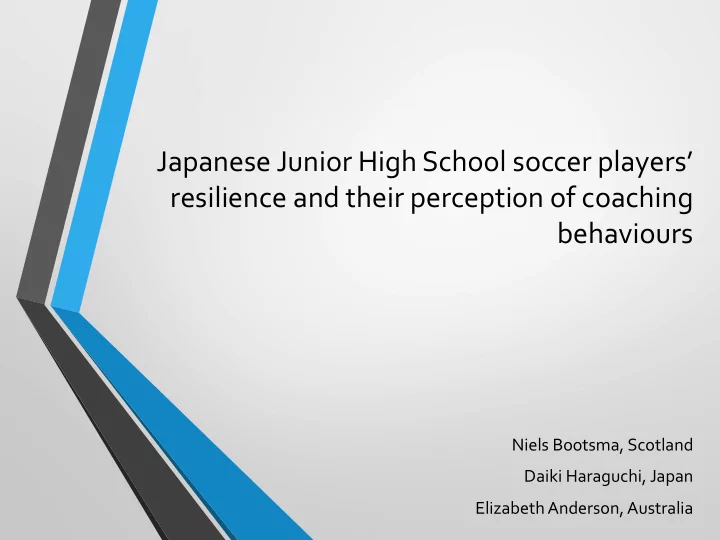

Japanese ¡Junior ¡High ¡School ¡soccer ¡players’ ¡ resilience ¡and ¡their ¡perception ¡of ¡coaching ¡ behaviours ¡ ¡ ¡ Niels ¡Bootsma, ¡Scotland ¡ Daiki ¡Haraguchi, ¡Japan ¡ Elizabeth ¡Anderson, ¡Australia ¡ ¡ ¡
BACKGROUND ¡ • Benefits ¡of ¡participation ¡in ¡extracurricular ¡sport ¡ ¡ • Japanese ¡government ¡wants ¡to ¡promote ¡youth ¡development ¡through ¡participation ¡ in ¡sport ¡ • Athletes ¡get ¡exposure ¡to ¡promotive ¡factors ¡as ¡described ¡the ¡resiliency ¡theory ¡ • Extracurricular ¡sports ¡clubs ¡in ¡Japanese ¡Junior ¡High ¡Schools ¡increasingly ¡use ¡ external ¡coaches ¡ • Research ¡suggests ¡these ¡coaches ¡are ¡mostly ¡unqualified ¡and ¡cases ¡of ¡violence ¡ occurring ¡(MEXT, ¡2013). ¡ ¡ • This ¡suggests ¡that ¡the ¡potential ¡outcomes ¡that ¡the ¡Japanese ¡government ¡desires ¡is ¡ not ¡occurring. ¡ ¡ • How ¡is ¡this ¡lack ¡of ¡knowledge ¡of ¡coaching ¡impacting ¡Japanese ¡students’ ¡well-‑ being? ¡ ¡
• Resilience ¡has ¡been ¡shown ¡to ¡be ¡positively ¡associated ¡ with ¡sporting ¡performance ¡and ¡psychological ¡well-‑being ¡ ¡ ¡ Resiliency ¡theory ¡is ¡a ¡strengths-‑based ¡approach ¡and ¡focuses ¡ on ¡promotive ¡factors ¡ Promotive ¡factors ¡help ¡individuals ¡deal ¡with ¡risk ¡factors ¡ Promotive ¡factors ¡are ¡ personal ¡assets ¡such ¡as ¡self-‑efficacy ¡as ¡ well ¡as ¡ resources ¡ such ¡as ¡a ¡coach, ¡parents ¡or ¡team ¡mates ¡
• Resilience ¡is ¡currently ¡a ¡hot ¡topic ¡as ¡academics ¡explore ¡ and ¡try ¡to ¡understand ¡how ¡to ¡measure ¡resilience ¡ specifically ¡in ¡sport ¡ • We ¡would ¡like ¡to ¡find ¡out ¡what ¡Japanese ¡Junior ¡High ¡ Schools’ ¡coaching ¡behaviours ¡influence ¡resilience ¡
AIM ¡ • Our ¡ aim ¡is ¡to ¡explore ¡perceived ¡coaching ¡ behaviours ¡of ¡external ¡coaches ¡in ¡Japanese ¡Junior ¡ High ¡School ¡extracurricular ¡soccer ¡clubs ¡and ¡their ¡ relationship ¡with ¡levels ¡of ¡student ¡resilience ¡
Research ¡questions ¡ 1. What ¡are ¡the ¡perceptions ¡of ¡Japanese ¡Junior ¡High ¡ School ¡soccer ¡players ¡about ¡the ¡behaviours ¡of ¡their ¡ coach? ¡ 2. In ¡what ¡ways ¡do ¡coaching ¡behaviours ¡influence ¡ resilience? ¡ 3. ¡How ¡are ¡coaching ¡behaviours ¡perceived ¡differently ¡ between ¡male ¡and ¡female ¡students? ¡
Methods ¡ ¡ ¡ Type : ¡Qualitative ¡ Design : ¡Case ¡study ¡ Context : ¡4 ¡Japanese ¡Public ¡Junior ¡High ¡Schools ¡in ¡Tsukuba ¡ • Only ¡Japanese ¡students ¡ Participants: ¡ • 13-‑15 ¡years ¡old ¡ • Extracurricular ¡soccer ¡players ¡ • Male ¡& ¡female ¡
Sample ¡ • 32 ¡students ¡(16 ¡female, ¡16 ¡male) ¡ • ¡8 ¡coaches ¡ • 4 ¡female ¡and ¡4 ¡male ¡teams ¡ ¡ Sample ¡Selection: ¡ • Four ¡Public ¡Schools ¡in ¡Tsukuba ¡with ¡male ¡and ¡female ¡ extra-‑curricular ¡soccer ¡teams ¡ • One ¡female ¡and ¡one ¡male ¡team ¡from ¡each ¡school ¡(40 ¡ participants) ¡ • Randomly ¡select ¡10 ¡students ¡from ¡each ¡team ¡to ¡ complete ¡resiliency ¡scale ¡ ¡ • 10-‑item ¡Connor ¡Davidson ¡Resilience ¡Scale ¡(10-‑CD-‑RISC) ¡ • Identify ¡two ¡lowest ¡and ¡two ¡highest ¡resilient ¡students ¡ ¡
Data ¡Collection ¡ • Interviews ¡(2 ¡per ¡participant) ¡ • Interview ¡questions ¡based ¡on ¡resiliency ¡theory ¡ • Reflection ¡diary ¡(Entry ¡following ¡each ¡training/ ¡ competition ¡day) ¡ • Video ¡record ¡training ¡to ¡triangulate ¡findings ¡ ¡
Procedure ¡ ¡ • Pre-‑study ¡(Ethics) ¡ • Contact ¡and ¡gain ¡permission ¡from ¡schools ¡ • Parental ¡consent ¡ • Assent ¡from ¡students ¡ • Study ¡(Start) ¡ • Selection ¡procedure ¡ • Provide ¡diaries ¡ • Study ¡(Week ¡1&2) ¡ • Observe ¡and ¡record ¡each ¡training ¡session ¡ • Interview ¡students ¡and ¡check ¡diaries ¡after ¡2 ¡weeks ¡ • Study ¡(Week ¡3&4) ¡ • Observe ¡and ¡record ¡each ¡training ¡session ¡ • Interview ¡students ¡and ¡return ¡diaries ¡after ¡4 ¡weeks ¡ ¡
Data ¡Analysis ¡ ¡ • Primary ¡and ¡secondary ¡coding ¡of ¡interviews, ¡video ¡ recordings ¡and ¡diary ¡entries ¡ • Identify ¡themes ¡relating ¡to ¡promotive ¡factors ¡e.g. ¡self-‑esteem, ¡ self-‑efficacy ¡ ¡ • Use ¡triangulation ¡of ¡video ¡recorded ¡data, ¡diary ¡records ¡ and ¡interviews ¡to ¡interpret ¡student ¡perceptions. ¡ ¡ • Compare ¡perceptions ¡of ¡coach ¡behaviours ¡between ¡ students ¡with ¡high ¡levels ¡of ¡resilience ¡and ¡low ¡levels ¡of ¡ resilience. ¡ ¡
Journal ¡Articles ¡ 1. Psychology ¡of ¡Sport ¡and ¡Exercise ¡Science ¡ Has ¡recently ¡published ¡two ¡research ¡articles ¡that ¡used ¡the ¡CD-‑DRS ¡ in ¡sport ¡(including ¡this ¡year). ¡ ¡ 2. Journal ¡of ¡Japan ¡Society ¡of ¡Sports ¡Industry ¡ ¡
Academic ¡Conferences ¡ 1. Nippon ¡Sports ¡Science ¡University ¡(NSSU) ¡ • Coach ¡Development ¡Academy ¡Conference ¡in ¡conjunction ¡with ¡ MEXT ¡and ¡TOKYO ¡2020 ¡Olympic ¡Committee ¡ 2. International ¡Council ¡for ¡Coaching ¡Excellence ¡(ISSE) ¡ 3. The ¡mission ¡of ¡the ¡ICCE ¡is ¡to ¡lead ¡and ¡support ¡the ¡ development ¡of ¡sport ¡coaching ¡globally. ¡In ¡light ¡of ¡this ¡ mission, ¡the ¡Conference ¡aims ¡to ¡showcase ¡and ¡evaluate ¡the ¡ important ¡impact ¡sport ¡coaching ¡plays ¡throughout ¡all ¡levels ¡ of ¡sport ¡and ¡society ¡across ¡the ¡globe. ¡ 4. Japan ¡Coaching ¡Conference ¡ ¡ • International ¡Coaching ¡Federation ¡
Recommend
More recommend